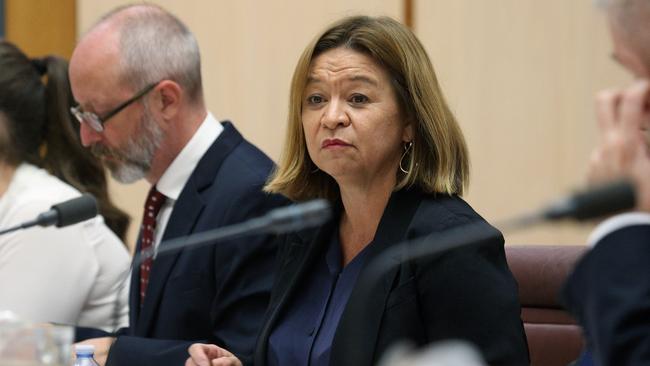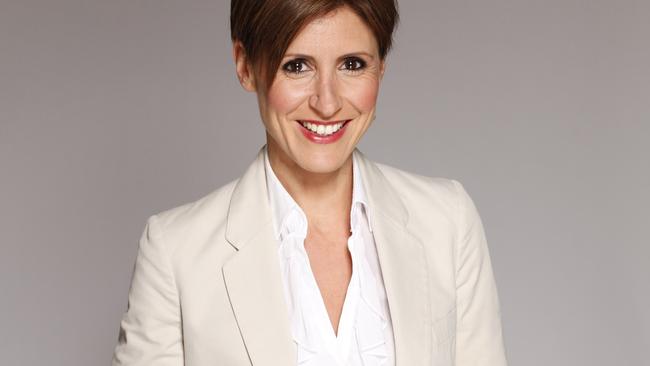ABC ‘did not do a WikiLeaks’ on cabinet papers
The ABC has defended its actions around the leak of top-secret cabinet documents, saying it chose not to do a ‘WikiLeaks’.

Inadequate editorial resources were to blame for the publication of Emma Alberici’s contentious articles on corporate tax, ABC managing director Michelle Guthrie said today as she accepted responsibility for the process.
“We absolutely take collective responsibility for the failure of our processes to catch the errors before the articles were published,” Ms Guthrie told a Senate Estimates committee hearing today.
The ABC rewrote both a news article and an analysis article after publishing them in February and deciding they had errors of fact and omission and a lack of impartiality. The ABC is still working through complaints from the prime minister’s office and business leaders.
Director of editorial policy Alan Sunderland today said he expected some of those would be upheld and some dismissed.
The managing director said the ABC had moved resource to be as technology and platform agnostic as possible. “As we made those changes I very much take responsibility that we did not put adequate resources in places to maintain the editorial quality we needed across all our platforms.
“We have really made those changes in a rapid fashion.”
The ABC had told the senators that problems with the articles were not detected before publication.
“It is not at all uncommon for stories to be written and an editing process to go through,” Sunderland said. “What’s unusual is that it slipped through our process before it was published and we had to do it full public glare.”
But he defended the stories as being important and significant, while Ms Guthrie reaffirmed her support of Alberici.
The ABC produced a timeline on how it came to be in possession of cabinet documents that became known as The Cabinet Files.

The journalistic treatment of the files and its decision to return the documents to the government have been criticised.
“We did our journalism, having done our journalism and satisfied we had done all our reporting that needed to be done and assessed it, our view was we had finished with them,” Sunderland said.
“We did not leave hundreds of untold stories.
“We published everything in those documents matters of public importance that the public should know about and did not know about.
“This was not a Pentagon Papers-type leak from a whistleblower designed to uncover a scandalous activity,” he said.
The nine stories written met the test of a public interest story, as decided by the ABC.
“You can do two things with these documents — you can take the WikiLeaks approach that it all just belongs on the public record regardless of whether there is any merit to it,” Mr Sunderland said.
The other approach was thinking they weren’t theirs and they should give them back.
“Or you can take the journalistic path a responsible media organisation would take to assess those documents and report every single story that met our criteria,” he said.
“That is what we did.” The ABC looked over the documents for about four months from last September before publishing.
Mr Sunderland joked the broadcaster would be happy to receive another cabinet file of documents.
“We would be very pleased to go through them,” he told senators.
The ABC said it was “assured” that FOI editor Michael McKinnon’s brother, Allan McKinnon, the deputy secretary Prime Minister and Cabinet, had no role to play in release of the files.
Guthrie made the ultimate decision to return The Cabinet Files to the government in consultation with news director Gaven Morris, editorial director Alan Sunderland and legal counsel.
“There were documents that did pose a national security risk and were not in the public interest to publish,” Guthrie said.
Sunderland defended using freedom of information editor Michael McKinnon and political reporter Ashlynne McGhee to work on the stories and not more experienced investigative reporters from a program such as Four Corners.
“We had the right team working on that,” Sunderland said.
When asked why a team from Four Corners, for example, were not used, Mr Sunderland said: “There was no particular reason to get back program teams who were on leave.”
“I have the utmost respect for both reporters.”
Additional reporting: AAP




To join the conversation, please log in. Don't have an account? Register
Join the conversation, you are commenting as Logout